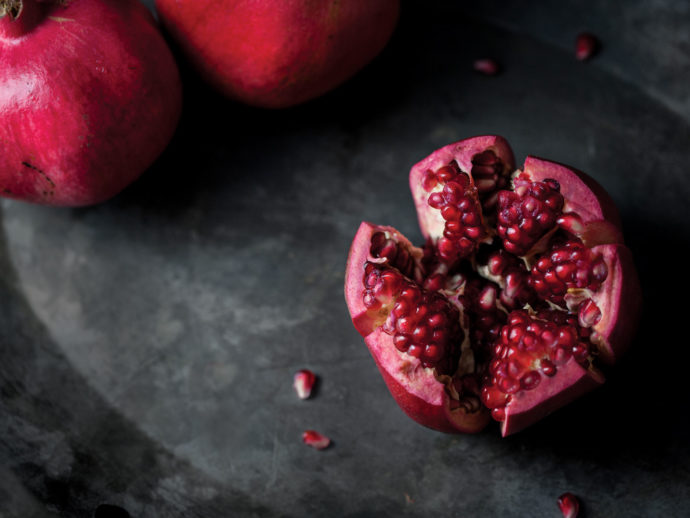When it comes to what you eat, rich red whole foods can bless you not only with deliciousness, but also with a healthy heart. Eat your heart out!
When it comes to heart health and your diet, think red. Although there are some notable exceptions (think processed, cured meats like sausage and cold cuts), there’s a wide range of red foods rich in heart-healthy nutrients—that’ll do your heart good.
Pomegranate
Why we ♥ it
Loaded with potent antioxidants (tannins and anthocyanins), pomegranates, often consumed as juice or in extract form, help fight inflammation and protect HDL (good) and LDL (bad) cholesterol from oxidation and arteries from plaque buildup, as well as beneficially decreasing blood pressure.
Red and pink grapefruit
Why we ♥ it
A lycopene star, grapefruit is also blessed with fibre, potassium, vitamin C, and choline—all contributing to better heart health: studies have shown that grapefruit may help improve blood pressure and lipid levels. It has the added bonus of being extremely hydrating, since it’s 91 percent water.

Apple
Why we ♥ it
An apple a day keeps … the cardiologist away? Maybe, as it turns out. An apple a day—peel and all—can reduce LDL (bad) cholesterol by as much as 40 percent, and an 18-year study of 34,000 postmenopausal women found a link between apple eating and a lowered risk of dying from heart disease.
Strawberry/raspberry
Why we ♥ it
Strawberries and raspberries are loaded with anthocyanins and quercetin with a wide range of heart-health benefits attributed to their antioxidant, anti-inflammatory, and antimicrobial properties. Their fibre and potassium also help stabilize blood sugars to ward off diabetes— a risk factor for heart disease.
Cranberry
Why we ♥ it
Not only are cranberries delicious, but they’re also considered a superfood due to their high levels of antioxidant polyphenols, which may reduce the risk of cardiovascular disease. Cranberries’ anti-inflammatory properties are thought to help prevent platelet build-up and reduce blood pressure.
Beet
Why we ♥ it
Not only blessed with an abundance of essential everyday nutrients like B vitamins, iron, manganese, copper, magnesium, and potassium, beets are also rich in nitrates that the body converts to nitric oxide, which helps improve circulation and possibly lowers blood pressure.

Tomato
Why we ♥ it
Tomatoes are well known as lycopene superstars. One of the key components of the Mediterranean diet, lycopene is particularly beneficial for cardiovascular health and heart disease prevention. Cooking tomatoes (think tomato sauce) greatly increases the bioavailability of lycopene.
Red snapper
Why we ♥ it
Like salmon, red snapper is rich in heart-healthy omega-3 fatty acids along with selenium, which research has shown plays a role in heart health, and potassium, important in managing high blood pressure.
Salmon
Why we ♥ it
The omega-3 fatty acids in salmon are a heart lover’s dream; they reduce inflammation, lower blood pressure and triglyceride levels, and may help prevent abnormal heart rhythms. Canada’s Food Guide recommends at least two servings (3.5 oz/99 g) of omega-3-rich fish (also lake trout, mackerel, herring, sardines, and tuna) a week for your heart.

Red cherry
Why we ♥ it
Red cherries are antioxidant powerhouses with plenty of vitamins A and C and are also known for their anti-inflammatory properties. As well, cherries are a natural source of melatonin, important for getting a good night’s sleep to keep our hearts healthy.
Red cabbage
Why we ♥ it
Red cabbage is full of heart-healthy benefits like its cruciferous cousins kale, Brussels sprouts, and broccoli. The anthocyanins in red cabbage are powerful antioxidants, and it’s also a great source of fibre, vitamins C and B6, potassium, and manganese. Eating it raw will do your heart good.
Red lentil
Why we ♥ it
Like other legumes, red lentils are fibre rich and low on the glycemic index—making them excellent protein sources to stabilize blood sugar levels. They also contain heart-healthy, blood pressure-lowering potassium, calcium, and magnesium.
Red potato
Why we ♥ it
Along with plenty of fibre, all potatoes, especially red potatoes, are loaded with potassium—beating even bananas. But don’t waste the potato skin, where much of the heart-healthy potassium is found. Vitamin C, a potent antioxidant, is also found in abundance in red potatoes.
Watermelon
Why we ♥ it
Although watermelon is 90 percent water, it’s also a nutrient-dense food. With concentrations of bioavailable lycopene even higher than lycopene superstars tomatoes, it’s far more than a summertime thirst-quencher. Lycopene is linked to lower rates of heart disease through both its antioxidant and anti-inflammatory properties.
Red kidney bean
Why we ♥ it
Because kidney beans are rich in protein, fibre, and complex carbs, they’re one of the best dietary choices for maintaining healthy blood sugar levels to avoid diabetes—a major health risk for heart disease.












